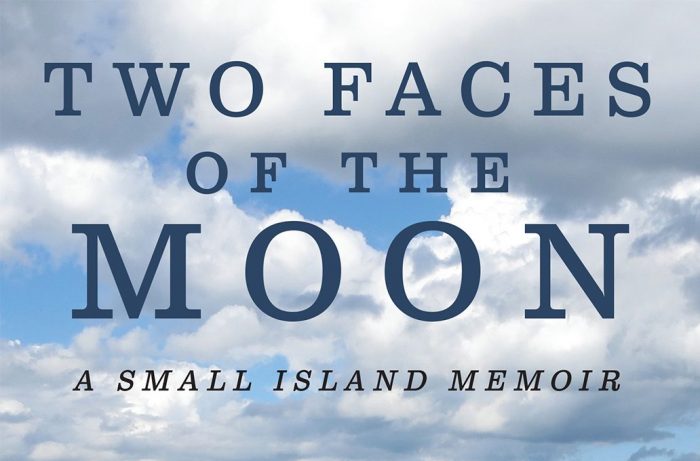Reviewed by Jeffrey Sanzel
Carolyn McGrath’s Two Faces of the Moon: A Small Island Memoir [Brandylane Publishers, Inc.] first presents as an idyllic echo of the natural world. And while the book touches on the bounty and splendor of nature, the work is much more. Two Faces is a rich, sometimes dark, but wholly truthful familial reflection.

While written during the pandemic, Two Faces of the Moon takes place in 2001, the year of her nonagenarian mother’s passing. McGrath establishes the tone by opening with her delivery by cesarean section—“lifted into the world unsullied by the normal push and pull.”
McGrath’s storytelling is boldly unsentimental. She was born to a mother of thirty-six and a father of forty-seven, a man who had a daughter from a marriage twenty years earlier. McGrath lost her father when she was seventeen but found herself constantly drawn to this “troubled man, an alcoholic, a heavy smoker, a war veteran, whose great talent for cussing often caused my mother to cover my ears. A father who clearly wished he had a son instead.”
The statement paves the way for years of rumination about their thorny relationship, explored throughout this slender, powerful autobiography. While many works of this nature err towards the hagiographic, McGrath is unflinching and frank in her account.
Each summer, McGrath leaves her Long Island suburban home to drive five hundred miles north to Bob’s Lake, Ontario. There, she spends several months living in the 1926-built log cabin her father bought in 1937 for $400. Life is rustic, with an outhouse and a four-burner kerosene stove. She must drive to the nearby farm to draw drinking water from a well. She is accompanied by her dog, Blue, and is joined by the neighbor’s dog, Ring.
While pondering the saying, “You could never go home again,” she answers: “The trick is to have two homes and never really leave either. I leave home to come home every summer and find it just the same.”
 While the book delves into the history of the island, the house, and the lake, Two Faces of the Moon is, first and foremost, a tale of family. McGrath’s vivid, distinctly raw prose recalls the opening line of Tolstoy’s Anna Karenina: “Happy families are all alike; every unhappy family is unhappy in its own way.” She alternates between the 2001 narrative in present tense and musings on her parents’ lives. The intersection creates friction that leads to constant sparks of insight.
While the book delves into the history of the island, the house, and the lake, Two Faces of the Moon is, first and foremost, a tale of family. McGrath’s vivid, distinctly raw prose recalls the opening line of Tolstoy’s Anna Karenina: “Happy families are all alike; every unhappy family is unhappy in its own way.” She alternates between the 2001 narrative in present tense and musings on her parents’ lives. The intersection creates friction that leads to constant sparks of insight.
She celebrates her isolation. “The delicious feeling I have of being alone here is nothing like loneliness.” She examines the motivations for these journeys: “I discovered my craving for solitude when I realized that I was losing myself. There must be many wives like me who feel their lives were commandeered by the demands of marriage and family.” While directly referencing her parents, family, and friends, she never speaks of her husband by name.
For all the things she admired about her father, she was afraid of him and felt “as a role model, my dad was terrible.” The outdoorsman focused on fishing, hunting, and frogging. “Guns were like wallpaper while I was growing up.” She aimed to please him but was also aware of the complexity of their bond.
In the present, she details visiting her elderly, ailing mother in the nursing home located an hour from the cabin. She paints one of the most vivid and heart-breaking portraits of aging, with a painfully accurate depiction of dementia. Her reaction to her mother’s passing and its aftermath is one of the most insightful moments in the book.
“While I’m here in the cabin, I feel I’m with both of my parents. My dad’s presence is everywhere […] my mother’s apron still hangs behind the kitchen door…” She shares her parents’ histories, scrutinizing their paths as a tool to reflect on her own choices. She accomplishes this without judgment but with a keen self-awareness. “It seems to me that children are born to be conflicted,” asking the questions: “Which parent do you love more? Fear more? Respect more?”
Living on the island is meditative, her own Walden Pond. And while she examines her life, she never loses the chance to be at one with her surroundings. “I wake up to the sound of Ervin’s cattle lowing lazily across the bay, where they’ve come down to drink. Through the window, I watch seven young ducklings following their momma […] all moving as one large duck atom, no sound. Song sparrows have hatchlings in a tree cavity …”
Her world is a strange mix of stillness and teeming activity, allowing her to think, wonder, and, above all, feel. McGrath imparts wisdom and fallibility in equal measures. In short, she movingly presents a human being in all her dimensions. McGrath knows a long life comes with “pleasures and rewards, its booby traps and tortures.” She shares her experiences, trials, triumphs, and perspectives in the honest, sometimes lyrical, and always memorable Two Faces of the Moon.
ABOUT THE AUTHOR:
Carolyn McGrath has a degree in classics from the University of Iowa and an MA in creative writing from Stony Brook University in New York where she taught for years in the Department of English and directed the Stony Brook $1000 Short Fiction Prize. She now lives in Charlottesville, Virginia. Two Faces of the Moon is available on Amazon.com, and at Barnes & Noble.





